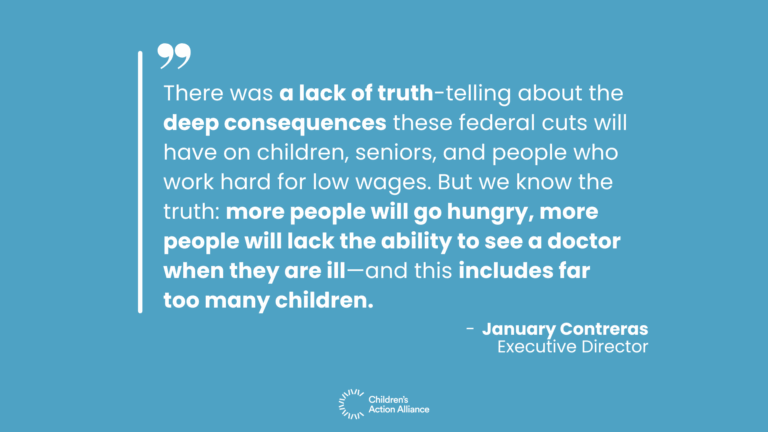
The Bills That Got Away
Every year, Arizona Legislators introduce hundreds of bills, and very few of them go through the entire process to end on the Governor’s Desk for a signature. And each year, many bills never get a hearing at all. There are many good proposals to help children and families in Arizona thrive that deserve recognition and merit consideration for future legislative action. Here are some of CAA's top picks.
HB 2071, Sponsor: Laura Terech, Schools; corporal punishment; prohibition
Hard to imagine but despite overwhelming evidence that it is harmful, Arizona law still allows corporal punishment in public and charter schools. This bill would have prohibited teachers, principals, and other school employees from using corporal punishment as a form of discipline.
HB 2137, Sponsor: Athena Salman, Children's health insurance program; eligibility
This bill would expand eligibility for KidsCare, the state's children’s health insurance program (CHIP), to families earning under 250% of the federal poverty level (currently 200%). These families are working but not earning enough to afford employer-based or marketplace health insurance coverage. This would not only decrease the number of uninsured children in Arizona, but it would save the state the money spent on uncompensated care when emergencies occur or when preventative care is avoided.
HB 2160, Sponsor: Judy Schwiebert, School mental health professionals; academy
We know the COVID pandemic amplified an existing mental health crisis across the country, and it has been very prevalent in school-aged children and adolescents. Arizona is already facing a shortage of school personnel such as teachers, bus drivers, and aides. This bill would have created a School Mental Health Professional Academy to incentivize and train school psychologists, social workers, and counselors, who are often the first line of defense when school-age children are struggling.
HB 2246, Sponsor: Oscar De Los Santos, AHCCCS; eligibility; immigration status
Currently, a person’s immigration status might prevent them from qualifying for Medicaid health care insurance benefits, even if they meet all of the other criteria. This bill would have removed this barrier reducing Arizona’s uninsured rate and the costs associated with uncompensated emergency and preventative care.
HB 2365, Sponsor: Leezah Sun, Foster children; adulthood; stipend
When children age out of the foster care system, the transition to adulthood can be difficult. Unless they enter extended foster care, they lose most of the resources and supports provided to them and are expected to care for themselves. In an attempt to help ease that transition, this bill would have provided all children who are in the care of the Department of Child Safety when they turn eighteen, a monthly stipend of $1200/month until they reach the age of twenty-one.
HB 2407, Sponsor: Laura Terech, Preschool pilot program; appropriation
Children who attend high-quality preschool programs are more likely to enter kindergarten ready to learn and succeed. Unfortunately, many families most in need are unable to find or afford to place their children in these programs. This bill would have established a school district-based Preschool Pilot Program and set aside $3M in funding to pay for it.
HB 2685, Sponsor: Alma Hernandez, Appropriation; Child Care Assistance
For families to be self-sufficient, they need safe, reliable, and quality places for their children to go while they are working. One year of infant care can often cost as much as a year’s tuition to a state university, leaving families to choose between earning more or staying out of the workforce to care for their children. This bill would have appropriated $30M to the Department of Economic Security to help low-income working families afford child care in home, center, or faith-based settings.
SB 1267, Sponsor: Christine Marsh, Eligibility; children's health insurance program
Similar to HB 2137, this bill would have increased eligibility for the children’s health insurance program to 300% of the federal poverty level. Again, reducing the number of uninsured children and reducing the costs associated with uncompensated care.
SB 1643, Sponsor: Sally Ann Gonzales, Indian child welfare; custody proceedings
This bill would have codified the protections of federal The Indian Child Welfare Act (ICWA) in state law. ICWA was passed in 1978 to combat the systematic separation of Native American children from their parents, families, and tribal communities following a long history of forcibly removing Native American children from their homes and sending them to boarding schools and non-Native adoptive families. The purpose of ICWA is to “protect the best interests of Indian children and to promote the stability and security of Indian tribes and families” (25 U.S.C. § 1902). ICWA requires child welfare agencies to go to greater lengths to preserve families before Native American children can be separated from their parents, provides a preference for the placement of Native American foster children with relatives and tribal members, and allows tribal courts to take jurisdiction over foster care cases from state courts. With a Supreme Court challenge to ICWA pending, a number of states have passed laws to preserve these important protections for Native American children, families, and tribes.



